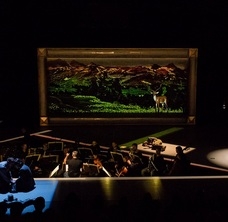Weisse Rose on GNO TV
The iconic play of Udo Zimmermann comes on GNO TV
Available for on-demand viewing from 14 March until 31 July 2021
on nationalopera.gr/gnotv/en
A lyrical hymn against Nazism, the contemporary masterly operaWeisse Rose (1986) by acclaimed German composer Udo Zimmermann , one of the most stunning works of the late 20th century, was received its Greek premiere by the Greek National Opera Alternative Stage.

The emblematic work, that established itself at the world's most prestigious theatres enthralling audiences and critics, is conducted by GNO conductor Nicolas Vassiliou and directed by Themelis Glynatsis, one of the most outstanding directors of his generation.
Inspired from the resistance of 24-year-old Hans and 21-year-old Sophie Scholl, two siblings from Munich, who were the founding members of the anti-Nazi student group Die Weisse Rose, Zimmermann composed a music work full of emotional power, unfolding right before the Scholl's execution for high treason. Historical re-enactment gives its place to a heart-wrenching, personal exploration of moral integrity, death and political responsibility.
Deeply moving and absolutely topical, Weisse Rose is an ode to the power of human will against fascism, and to the "inner resistance, a resistance that praises love, life and justice", as the director characteristically notes.
Weisse Rose was directed by Themelis Glynatsis, one of the most prolific and restless directors of his generation, who is actively involved in opera and music theatre staging. His rich résumé includes important productions, such as Winter Journey, based on Franz Schubert's song cycle from the Romantic period Winterreise (2015), Handel's baroque masterpiece Alcina (2016) and 57 // a passion play in collaboration with Giorgos Koumendakis (2016).
The direction is a combination of deep innerness and violent outbursts in an environment that transforms from a cell into a space of memory and a field of resistance. "At the heart of the performance lies the solitude of the two characters, which does not help the audience decide whether they really coexist in the same vast space, or whether they communicate in another, more mystical way. Solitude, which imposes a second reality between memory and religious vision, leads to the need for redemption, and at the same time, to political aggression", notes the director Themelis Glynatsis.
Hans Scholl was performed by distinguished tenor Christos Kechris, who -after his performance in the role of Cricket in Katerina Evangelatos' opera Z- was called to tackle once again a role of high vocal and acting demands.
In the role of Sophie Scholl, the talented soprano Afroditi Patoulidou, who is carving out a bright career abroad, with important distinctions and appearances at major European theatres.
Weisse Rose at a glance
"We will not remain silent, we are your bad conscience, the White Rose will not leave you in peace..." These are the closing words of the fourth manifesto of the anti-Hitler student group named "The White Rose" (Die Weisse Rose), formed at the University of Munich. This particular manifesto was the cause for the arrest of the group's leaders, Hans Scholl and his sister Sophie. After a long interrogation by Gestapo, the siblings were executed by guillotine on 22 February 1943.
This is the historical framework surrounding Udo Zimmermann's opera Die weisse Rose, whose first version was written in 1967. However, the composer reworked his material in 1986, when he was asked to revive it for the Hamburg State Opera. The composer discarded the original libretto penned by his brother, Ingo Zimmermann, and entrusted the libretto of the new version to Wolfgang Willaschek, presenting a totally new work in sixteen scenes. In the new version, the action is no longer linear, and the characters are limited to two, the Scholl siblings. This version was received its Greek premiere by the GNO Alternative Stage.
The opera Weisse Rose first premiered at the Hamburg State Opera on 27 February 1986.
Weisse Rose doesn't follow a linear narrative path; it focuses on the emotional charge of the two characters awaiting their execution. The two characters sometimes talk to themselves, other times they talk to each other, but the audience is never sure whether these dialogues are real or just figments of Hans and Sophie's imagination. Under this light, the work is not clearly historical, but uses historical memory to treat subjects such as moral integrity, political complicity and religious faith.
The work's basic material are the memories of its two characters, their feelings and thoughts about the crimes committed by the Nazis. The libretto is a mixture of poetic language and facts, masterly portraying both the special mental vibrations of Hans and Sophie, and the violence that drove them to oppose the Nazi regime.
Through a composition that balances between the almost absolute silence and the densely-written musical explosion, Zimmermann moulds a special music work which simultaneously converses with Bach's oratorios and the modernist tradition, explores Hans and Sophie's anxiety but also their innate romanticism, and denounces political passivity, complicity, and a whole people's conscious silence in the face of destruction.
Director's note
Udo Zimmermann's Weisse Rose is based on the experiences of Hans and Sophie Scholl, a brother and a sister from Munich who were the founding members of the anti-Nazi student group Die Weisse Rose. The work is set in the hour preceding Hans and Sophie's execution for high treasons and is divided in sixteen scenes. Weisse Rose doesn't follow a clear story-line; it focuses on the emotional intensity of two young people on death row. Sometimes the two characters speak to themselves, sometimes they speak to one another, but the audience is never sure whether these dialogues are real or just figments of Hans' and Sophie's imagination. From this perspective, the work is not purely historical but rather uses historical memory to address subjects such as moral integrity, political complicity and religious faith. The work's basic material derives from the memories of the two characters, their feelings, and their responses to Nazi crimes. The libretto is a mixture of poetic language and historical record, masterfully outlining both the special inner vibrations of Hans and Sophie, and the violence that compelled them to oppose the Nazi regime. Through a musical composition that balances in between almost absolute silence and densely scored musical explosions, Zimmermann moulds a unique work that simultaneously converses both with Bach's oratorios and the modernist tradition, as it explores the agony and the innate romanticism of Hand and Sophie, while decrying the political passivity, the complicity and the conscious silence of a whole nation in the face of disaster.
Themelis Glynatsis
Opera
Weisse Rose
Udo Zimmermann
Available on GNO TV from 11 March until 31 July 2021
The production was recorded on 17 November 2018 on the GNO Alternative Stage at the SNFCC. With Greek and English subtitles.
Conductor Nicolas Vassiliou
Director Themelis Glynatsis
Sets - Costumes Alexia Theodoraki
Lighting designer Stella Kaltsou
Video Marios Gambierakis, Chrysoula Korovesi
Hans Scholl Christos Kechris
Sophie Scholl Afroditi Patoulidou
Actor Andonis Gritsis
With the participation of Irini-Anastasia Vougiouka
Musicians
Marilena Dori (flute)
Κ ostas Yiovannis (oboe)
Grammenos Chalkias (clarinet)
Μ anos Ventouras (horn)
Spiros Arkoudis (trumpet)
Spyros Vergis - Ilias Vortelinas (trombone)
Babis Taliadouros (percussion)
Stefanos Nasos (piano)
Thodoris Matoulas (harp)
Dionysis Vervitsiotis - Franc Sestani (violin)
Eleftheria Toya (viola)
Alexandros Botinis (cello)
Yiorgos Arnis (double bass)
With the admission of 5€ the viewers:
Founding Donor of the Alternative Stage & Production donor
Stavros Niarchos Foundation (SNF) [www.SNF.org]

TICKET SERVICES - LOGISMIKI LTD
Call center: +30 210 7234567
e-mail: info@ticketservices.gr
Box office: 39, Panepistimiou Str. (Pesmazoglou Arc), Athens, Greece 
Working hours: Mon-Fri: 9am-5pm




